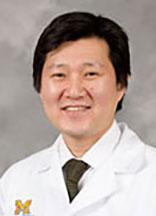
Daniel Beard
Dr. Beard is the Carl J. Wiggers Collegiate Professor of Cardiovascular Physiology in the Department of Molecular and Integrative Physiology and holds affiliate appointments in Biomedical Engineering and Emergency Medicine. His laboratory is focused on systems engineering approaches to understanding the biophysical and biochemical operation of physiological systems. His research interests center on cardiac energy metabolism. In particular, he is interested in understanding how the control of energy metabolism breaks down in heart failure, how loss of specific cytoplasmic pools in heart failure disrupts the energetic state, and if/how this metabolic failure determines the loss of mechanical function in heart failure. He is also interested in the etiology of hypertension by developing theoretical/computational models representing the short- and long-term mechanisms controlling arterial pressure, and using these models to guide experiments on animal models of hypertension. Specifically, models are used to generate hypotheses regarding the underlying mechanisms, and to design experiments to rule out competing hypotheses.

Charles Burant
Dr. Burant is Dr. Robert C. and Veronica Atkins Professor of Metabolism, and Professor of Molecular & Integrative Physiology at the University of Michigan Medical School. His laboratory studies the relationship between nutrients and the development of obesity, insulin resistance and diabetes. Dr. Burant uses a systems biology approach, combining clinical observations with metabolomic and transcriptomic measurements and making predictive models utilizing computational approaches. His ongoing projects include: (1) Evaluating the site and severity of insulin resistance in individuals with hepatitis C and the ability of high carbohydrate or low carbohydrate diets to modulate viral loads. (2) Assessing the individual impact of diet on lipomic and metabolomic profiles in humans and the associated changes in metabolic parameters. (3) Determining the changes in metabolite flux and gene expression changes in islets of diabetes-prone rats in response to diets with different fatty acid composition. (4) Evaluating the differences in gene expression and metabolite fluxes in muscle of rats bred for high and low exercise capacity.
Dr. Burant is NOT accepting summer fellows for 2022.

Tae-Hwa Chun
Dr. Chun is Assistant Professor of Internal Medicine, Division of Metabolism, Endocrinology and Diabetes. His research is focused on the roles of extracellular matrix (ECM) proteins and proteinases in the pathogenesis of obesity, insulin resistance and metabolic syndrome. In the body, metabolically active cells are surrounded by a fibrous composite of extracellular matrix proteins (e.g., type I collagen, elastin, and fibronectin). While being embedded within these dense matrices, adipocytes and their precursor cells constantly change their shape and function in adaptation to nutritional cues by remodeling pericellular ECM environment.

Malcolm Low
Dr. Low is the David F. Bohr Professor of Physiology in the Department of Molecular & Integrative Physiology. He is also a Professor in the Department of Internal Medicine at the University of Michigan Medical School. Dr. Low is an Investigator of the Brehm Center for Diabetes Research. Research in his lab is focused on determining how the hypothalamus integrates environmental and interoceptive sensory information to maintain neuroendocrine homeostasis and energy balance. He is an internationally recognized expert in the generation and analysis of mutant mouse models and currently uses a combination of molecular genetic, endocrine, and behavioral approaches to characterize the physiological functions of neuropeptides and G-protein coupled receptors that are highly expressed in hypothalamic neural circuits, particularly proopiomelanocortin (POMC), MC4-receptor, enkephalin, dynorphin, mu-opioid receptor, corticotropin releasing hormone, somatostatin, dopamine, and dopamine D2-like receptors. POMC neurons play a critical role in the regulation of appetite and metabolism and dysfunction in their associated neural circuits can produce morbid obesity. A current major project in the Low lab is to dissect the functional significance of the recently discovered neuronal enhancers in POMC using targeted deletions of individual or multiple enhancer sequences in mutant mice.
Dr. Low is NOT accepting summer fellows for 2022.

Carey Lumeng
Dr. Low is the Frederick G L Huetwell Professor for the Cure and Prevention of Birth Defects, Pediatrics (Division of Pulmonary Medicine) and Molecular & Integrative Physiology. His research goal is to understand the mechanisms by which obesity influences disease by investigating the association between obesity and inflammation. The obesity epidemic in adults and children is of concern due to associations between obesity and disease. There is strong evidence that obesity generates a low grade chronic inflammatory state that contributes to diseases such as type 2 diabetes, heart disease, asthma, and metabolic syndrome. His laboratory is investigating the hypothesis that this obesity-induced inflammation is due to the activation of inflammatory cells in fat tissue (adipose tissue). The finding that adipose tissue contains large quantities of inflammatory cells has led to a paradigm shift in obesity research where we now recognize that obesity may be an inflammatory disease. This provides new opportunities to design strategies to evaluate patients and to treat obesity-associated diseases.

Costas A Lyssiotis
Dr. Costas is Associate Professor of Molecular & Integrative Physiology. His lab studies the biochemical pathways and metabolic requirements that enable tumor survival and growth and, in particular, how this information can be used to design targeted therapies. Among his many contributions, Dr. Lyssiotis demonstrated that pancreatic cancers are addicted to glucose and glutamine and use these nutrients in previously undescribed pathways to make DNA and to generate free radical-combating antioxidants, respectively.

Ormond MacDougald
Dr. MacDougald is the John A. Faulkner Professor of Molecular & Integrative Physiology and of Internal Medicine at the University of Michigan Medical School. The long term goal of his research program is to determine the molecular mechanisms by which extracellular signals regulate adipocyte differentiation and metabolism. They have pioneered investigations into the role of Wnt signaling as a potent, endogenously produced inhibitor of adipogenesis. Wnt10b acts as an adipogenic switch, which must be shut off for cultured preadipocyte models to differentiate in vitro. Work from the laboratory has revealed that Wnt signaling, likely initiated by Wnt10b, maintains preadipocytes in an undifferentiated state through inhibition of the adipogenic transcription factors, C/EBP-alpha and PPAR-gamma. Ectopic expression of Wnt or activation of intermediates of the canonical Wnt signaling pathway results in potent inhibition of adipogenesis in cultured preadipocytes. Moreover, blocking Wnt signaling in preadipocytes by genetic means or by inhibiting Wnt action extracellularly triggers spontaneous conversion into adipocytes, indicating that endogenous Wnt signaling acts to repress the differentiation process. We are currently exploring the importance of Wnt10b in regulation of adipose tissue and bone development in vivo. Understanding the role of Wnt signaling in the development of adipose tissues will provide important insight into the medical problems of obesity and type II diabetes, two major health risks in the United States.

Martin Myers
Dr. Myers is Professor of Internal Medicine (Division of Diabetes, Endocrinology & Metabolism) and Molecular & Integrative Physiology. Dr. Myers is also Marilyn H. Vincent Professor of Diabetes Research. Research in the Myers lab focuses on the biology of leptin. The hormone leptin signals the body’s nutritional and metabolic status to the brain to regulate glycemic control, energy balance, and neuroendocrine function. Leptin acts via the long form of its receptor (LepRb) to regulate numerous distinct populations of neurons in the hypothalamus and elsewhere in the brain. Each different set of LepRb-expressing neurons serves a different function, and the totality of leptin action requires the coordinated response of all LepRb neurons. Starting with the molecular mechanisms of intracellular LepRb signaling, our focus also includes the study of the neural mediators of leptin action, since it is not possible to understand the regulation of metabolism and endocrine function without understanding the neurophysiologic as well as molecular basis of leptin action. Thus, in addition to examining the molecular details and importance of specific LepRb signals, we are dissecting the regulation and function of individual populations of LepRb-expressing neurons and examining the role of leptin in the development of neural circuits. By understanding the totality of leptin action in this way we hope to decipher the mechanisms by which leptin regulates the predisposition to diabetes and other aspects of the metabolic syndrome.

Vasantha Padmanabhan
Dr. Padmanabhan is Professor Pediatrics-Endocrinology and of Molecular & Integrative Physiology. Research focus of her laboratory is translational and mainly centers on understanding the fetal origin of pubertal and adult reproductive and metabolic disorders and the impact of native steroids and estrogenic environmental pollutants such a bisphenol-A in programming such defects. Utilizing integrative approaches ranging from cell and molecular biology as well as in vitro systems to whole animal physiology the emphasis is to understand the fundamental processes controlling reproductive cyclicity in the female, the mechanisms by which environmental / hormonal influences in early fetal life program reproductive dysfunction and metabolic dysfunction such as insulin resistance, features seen in women with Poly Cystic Ovarian Syndrome (PCOS), a major infertility disorder. Major emphasis is to identify early disruptions, underlying epigenetic mechanisms as well as develop prevention and treatment strategies that are translatable to human.

Subramaniam Pennathur
Dr. Pennathur is the Professor of Nephrology, Department of Medicine and Molecular and Integrative Physiology. He also directs the NIDDK funded Michigan Kidney Translational Research Center. His laboratory has a long-standing interest in understanding the chemistry and biochemistry of metabolic changes that underlie obesity, diabetes and its complications, including diabetic kidney disease and cardiovascular disease. The lab utilizes mass spectrometric methods to study lipoprotein biology, oxidant injury mechanisms (oxidative stress marker discovery and quantitation), lipid inflammatory mediators, metabolomics, and lipidomics in animal models and humans with diabetic complications and inflammatory disorders. Employing metabolomic and lipidomic profiling, data analysis, and bioinformatics to interrogate model systems, his laboratory has identified disease specific nodes for intervention in variety of metabolic diseases. These studies utilize systems and integrative biology of combining multi-omic data sets, which can provide ideal training opportunities for students interested in quantitative sciences.

Liangyou Rui
Dr. Rui is Louis G D'Alecy Collegiate Professor of Molecular & Integrative Physiology. His laboratory studies the physiological and molecular mechanisms of obesity, fatty liver, and type 2 diabetes, using genetic, physiological, molecular and biochemical approaches. Obesity is the primary risk factor for fatty liver diseases and type 2 diabetes and type 2 diabetes is caused by defects in both insulin production and insulin action (e.g. insulin resistance in the liver, muscle, fat and brain). Ongoing areas of study in the Rui laboratory include: (1) examination of the signal transduction pathways in hypothalamic neurons that regulate energy homeostasis and body weight, (2) investigating molecular defects in hypothalamic neural circuits that cause leptin resistance, energy imbalance and obesity, 3) studying glucose and lipid metabolism under both normal and obese conditions and focusing on the hepatic gluconeogenic and lipogenic programs as well as on the molecular mechanisms of insulin resistance in liver, adipose tissue and muscle.

Kanakadurga Singer
Dr. Singer is an Associate Professor of Pediatrics and Pediatric Endocrinology at the University of Michigan. She has an interest in understanding the cellular and endocrine dynamics leading from energy intake to an increase in adipose tissue mass and adipose tissue inflammation. Using a mouse model of diet-induced obesity she has been investigating how high fat diet alters hematopoietic stem cell and myeloid precursors contributing to systemic obesity-induced metainflammation and metabolic disease.
Dr. Singer is NOT accepting summer fellows for 2022.

Jun Wu
Dr. Wu is Assistant Professor of Molecular & Integrative Physiology, and Research Assistant Professor of the Life Science Institute. The profound health consequences associated with obesity emphasize the importance of developing effective therapeutic interventions. Dr. Wu's work focuses on a recently identified form of fat cells, so-called “beige cells.” Genetic manipulations that create more of these fat cells in mice have strong anti-obesity and anti-diabetic effects. Further understanding of beige fat biology is required to determine the role of human beige fat in energy expenditure and its value as a potential target for intervention. The isolation of beige adipocyte opened up a brand new field. We aim to elucidate 1) the molecular regulation of beige fat function, 2) the therapeutic potential of human beige fat and 3) the developmental origin of beige precursors. These ambitious aims will bring together leading laboratories to investigate the function and regulation of this new type of fat cells.

Lei Yin
Dr. Yin is Associate Professor of Molecular & Integrative Physiology. Dr. Yin’s lab investigates the functional link between insulin signaling and molecular clock in liver and its potential role in insulin resistance. Our initial results suggest that insulin signaling is tightly associated with circadian clock in liver cells, suggesting a functional crosstalk between these two pathways. We want to explore this finding using both cell culture and animal model. We have generated adenovirus for expressing or knocking down the core clock proteins and those reagents will be used to manipulate liver specific clock using tail-vein injection approach and then study insulin signaling and insulin function. The experimental approaches include RNA extractin, QPCR, protein isolation, immunoblotting as well as immunoprecipitation.
